|
Because
of the way it works, the mechanism for producing
film images is, of all the means of human expression,
the one that is most like the mind of man or,
better still, the one which best imitates the
functioning of the mind while dreaming.—Luis
Buñuel
|
Film
is of the mind, as life is of the mind. Film’s primary
component—writing as translated into a screenplay—begins
in the mind and returns to its point of origin by way
of visual and aural components. Thus, in the beginning
was the word and it became film. As such, the good to
great films are the best written and play primarily to
the mind.
Any good film is composed of the necessary elements of
writing, visuality (cinematography), sound and so on—all
of which necessarily appeal to the senses and which are
driven back to the mind. Acting, of course, combines all
the elements and is embodied in human beings, who are
themselves a creation and, thus, extensions of the word.
Since the life of the mind is the essence of existence,
it stands to reason that fine art should primarily be
concerned with the truth or truths that reside therein.
Although in an existence that often blurs distinctions
such actualities may often be indiscernible. Nonetheless,
the quest for truth defines the art form, including film.
This means there are not many great films, since most
play to the guttural instincts. And greatness, as we define
the term, is relative to any art form. Indeed, excellence
in any field, because of the frailty and flaws inherent
in human nature, is always a rarity.
Thus, in any year, choosing ten films that possibly represent
the best is difficult. Often the problem facing the reviewer
is finding ten that can be called the best. 2001, however,
is an exception. For whatever reason—mainly due,
however, to the long shadow cast by independent film—there
were more quality films this year. The following are ten
of those.
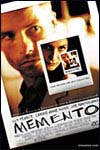 |
1.
Memento (R, 113 minutes). This film is an unforgettable
trip into the mind of Leonard Shelby (Guy Pearce), who
is a man with no short-term memory. He hasn’t been
able to form memories since the night his wife was murdered
and is driven to find her killer. However, for whatever
reason, he has no way of remembering names, dates, places,
facts and faces. Instead, he tattoos himself with mementos
of his search. When someone knows his name, he checks
his Polaroids to see if he knows the person. Thus, Shelby
is composed of many questions. Does he like this person?
Can he trust this person? Is this person the killer? Shelby
has no clue unless he’s scribbled a note to himself.
Writer/director Christopher Nolan places his camera in
Shelby’s head, and the viewer sees through Shelby’s
confused eyes. However, the initial revenge killing is
the end of the story. And like a person with no short-term
memory, you never know what happened before the current
scene. Thus, you’re condemned to live the story in
reverse order, along with Shelby.
What makes this film flow is director Nolan’s penchant
for storytelling. Although you might become frustrated
because Shelby’s world is so disoriented, you’re
forced to the very last second of the film. My suggestion
is to sit back, relax and try to figure out just how demented,
twisted and complex Shelby’s world is. And in the
process, you might realize that your world is very much
the same.
 |
2.
Sexy Beast (R, 88 minutes). Director Jonathan
Glazer, who has built a reputation for his dazzling Guinness
beer spots, gives us a blood-curdling, violent film that,
at points, has you giggling where you should be flinching.
Gal (Ray Winstone) is a retired criminal enjoying retirement
in Spain with friends and the woman he is devoted to.
Gal’s punctuated illusion is shattered by the arrival
of Don Logan (Ben Kingsley in one of his best performances
ever), a menacing psychotic who wants Gal for one last,
spectacular heist job. Gal is resistant, but Logan is
persistent and will do anything to force Gal back into
the saddle.
The brilliance of this film is that it manages to combine
so many disparate elements of film into a cohesive and
highly entertaining whole—thriller, comedy and love
story. Glazer definitely knows how to write, and he definitely
knows how to visually portray his subject. He interweaves
reality with illusion and dream with an artist’s
touch.
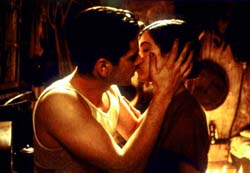 |
3.
The Devil’s Backbone (R, 106 minutes,
Spanish, subtitles). Guillermo del Toro’s first film,
Cronos (1994), is one of the best and bloodiest
vampire films ever made. He returned with Mimic
(1997), another horror flick and is now set to direct
the follow-up to the 1998 Blade. With The Devil’s
Backbone, del Toro out-Lynches David Lynch, but with
more coherence as he takes us to his own universe of childhood
fears. There no one is really what he appears to be, and
nothing is more illusory than reality.
Directed and co-written by del Toro, the film centers
on a child who is left stranded at an orphanage during
the Spanish Civil War. From there, the film focuses on
the life of the teachers and children who have been kept
shielded from the war and the fear and danger that surrounds
them. However, inside the prison walls of the orphanage,
security is an illusion and someone not of this world
lives there who seeks revenge for his death.
The screenplay for this film sings. However, del Toro,
who reunites with Cronos cinematographer Guillermo
Navarro, has a cinematic eye second to none. The director
creates a Gothic drama that is compelling, even if you’re
turned off by subtitles. This film will keep you engaged
throughout. Fine performances by Federico Luppi, Marisa
Paredes and Eduardo Noriega.
 |
4.
Mulholland Drive (R, 146 minutes). David Lynch
does not so much direct films as throw them at you. Even
when nothing is happening, somehow Lynch makes it suspenseful.
His genius is that he intersperses what some may think
to be cheap tricks with masterful cinemagraphic techniques
that keep you on the edge of your seat. One watching of
this film will have you asking what you have seen. Lynch
layers his plot with so many facts that there is no way
that it will come together quickly. Indeed, the plot of
this film is overshadowed by its theme, mood, character
development and Lynch’s filming techniques.
In a dual role, Naomi Watts (Betty Elms/Diane Selwyn)
displays an intricate versatility. The rest of the cast,
in Lynchian fashion, is enormously strange but engaging.
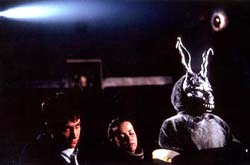 |
5.
Donnie Darko (R, 122 minutes). Director Richard
Kelly’s Donnie Darko is one of the year’s
surprises. This film is highly original and is a wonderful
piece of filmmaking. Darko is a disturbed adolescent from
a semi-functional, upper middle-class family. Darko, however,
is a brilliant kid who possesses the rare gift of foresight.
And, with his strange rabbit friend as his guide, he actually
has a chance at redemption. This film is a dark ride into
the darker side. But, to those who remember high school
and you weren’t a cheerleader or a football player,
you soon sympathize with Darko’s pissed-off attitude
toward the ridiculous, absurd nature of adolescence and
the forced-down lifestyle perpetuated by mindless educators.
Jake Gyllenhaal’s performance as Darko merits attention,
along with a fine supporting cast.
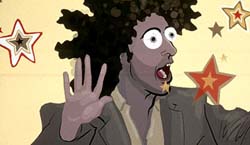 |
6.
Waking Life (R, 99 minutes). Richard Linklater’s
Waking Life is a surreal roller coaster ride into
the dream life of a man who encounters many characters.
His journey becomes one of meaning, perception and the
reality—or non-reality—of human existence.
Waking Life is concerned with the mysteries of
life and, in the end, focuses on our spiritual existence.
This film blasts you perceptually with constantly varying
animation styles. It takes time—about one-third of
the way through the film—for you to adjust to the
fact that maybe what we call reality is really animated
existence.
What if what we see as waking life is really a dream of
God and at some mercurial wisps we are lost in the vortex
of time? Linklater’s Waking Life is an intellectual
parade of a myriad of viewpoints and conflicting opinions
of people who, if gathered together in a single room,
would probably not disagree. In fact, they would all probably
agree on one point—that is, that nothing is quite
certain in what we may believe to be waking life and that
nothing is more certain than what we dream.
Waking Life is a challenge to the modern conception
that seems to permeate belief systems. Is there a spiritual
reality beyond materialism? Can we ever really know what
we know? Is our end really our beginning?
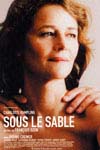 |
7.
Under the Sand (R, 96 minutes, French, subtitles).
François Ozon’s moving drama about a woman’s
yearning for her dead husband is one of the better French
films of recent years. Marie Drillon (Charlotte Rampling)
is a professor of English literature at a Paris university
whose husband apparently drowns in the ocean house while
they are on holiday. Unable to cope, Marie creates the
illusion that her husband is yet alive and continues to
interact with him upon her return home. There is a thin
line between death and life and spirits may live on, even
if they’re only mental apparitions.
However, it’s not so much the story that’s intriguing
about this film, it’s Rampling’s amazing performance.
Through her sensitive handling of her character, it is
easy to forget the effort that must have gone into her
performance in depicting an intelligent woman slowly going
to pieces. Moreover, Ozon managed to capture the special
sensuality of an older woman, which, considering the sexual
ambience of Rampling, may not have been all that difficult
to undertake.
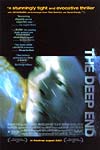 |
8.
The Deep End (R, 100 minutes). This is a modern
retelling of Max Ophuls’ 1946 thriller, The Reckless
Moment. The film centers on the theme of self-sacrifice—in
particular, the sacrifice of a mother who, in order to
protect her son, places herself in harm’s way. Margaret
Hall (Tilda Swinton) is a mother of three who is willing
to do whatever it takes to keep her family safe from the
forces that follow her teenage son home one night from
a seedy nightclub. Frightening events are set in motion
when Margaret, caught within the throngs of the unpredictability
of life, tries to cover up the accidental death of her
son’s deceitful friend. This inevitably leads to
a subplot of blackmail and intrigue.
The Deep End, poignantly filmed by directors Scott
McGehee and David Siegel, is driven by the overwhelming
performance of Swinton. She is a brilliant post-feminist
actress whose work sheds light on the paradoxes of femininity
and female power.
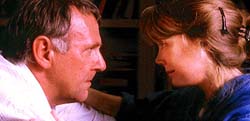 |
9.
In the Bedroom (R, 130 minutes). First-time director
Todd Field tells this simple and honest, but brutally
powerful, story well. Set in Maine, the Fowler family’s
apparent peace is superficial and is soon busted all-to-hell
when a bullet fells their only son. Matt Fowler (Tom Wilkinson)
and his wife Ruth (Sissy Spacek) find that when isolated,
their marriage, like the ocean that breaks against the
Maine shore, is full of undertow. Swirling outside their
leaking ship of a marriage, the murderer of their son
may go free. So mom and dad decide to do something about
it.
Field (who co-wrote the screenplay with Robert Festinger)
forces the viewer through a self-invasive, heartfelt ride
with familial and emotional conflicts of the main characters
in the film. Indeed, it is extremely difficult to avoid
some identification with the conflicts because of the
raw emotional power imbued in the scenes, especially between
those involving Wilkinson and Spacek.
If any film ever personified the essence of fine writing,
it is In the Bedroom. And Field’s handling
of the actors borders on magnificent. Tom Wilkinson, a
character actor in numerous films, emerges here as a candidate
for a best actor Oscar. And the buzz has already been
started on behalf on Spacek. The supporting cast is very
good as well, including Marisa Tomei, Nick Stahl and William
Mapother.
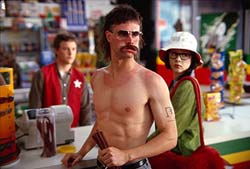 |
10.
Ghost World (R, 111 minutes). Terry Zwigoff’s
1995 film Crumb received acclaim for its honest
dissection of the famed cartoonist’s life. In Ghost
World, Zwigoff ventures into the fictional world of
best friends Enid and Rebecca, who have graduated from
high school and find themselves forced to cope with the
"real" world. Enid (Thora Birch) is a counter-culture
rebel who hates this world of frauds and losers. As a
consequence, she has trouble fitting into day-to-day life
and has a difficult time getting and keeping a job. Then
one day the girls decide to play a prank on a lonely,
middle-aged loser named Seymour (Steve Buscemi). Their
plan backfires, and Enid finds herself drawn into Seymour’s
rather drab but kinky world.
Zwigoff directs the film based on a script by Dan Clowes,
who created the original comic book "Ghost World."
This strange film is dominated by two fine performances.
Young Thora Birch carries her role well, but it is Steve
Buscemi’s acting that dominates.
|